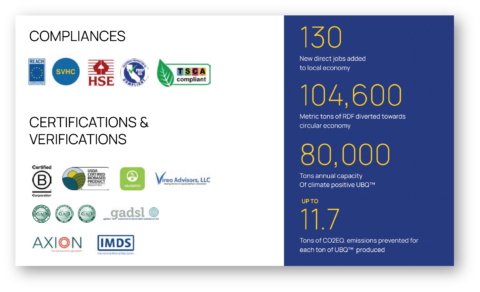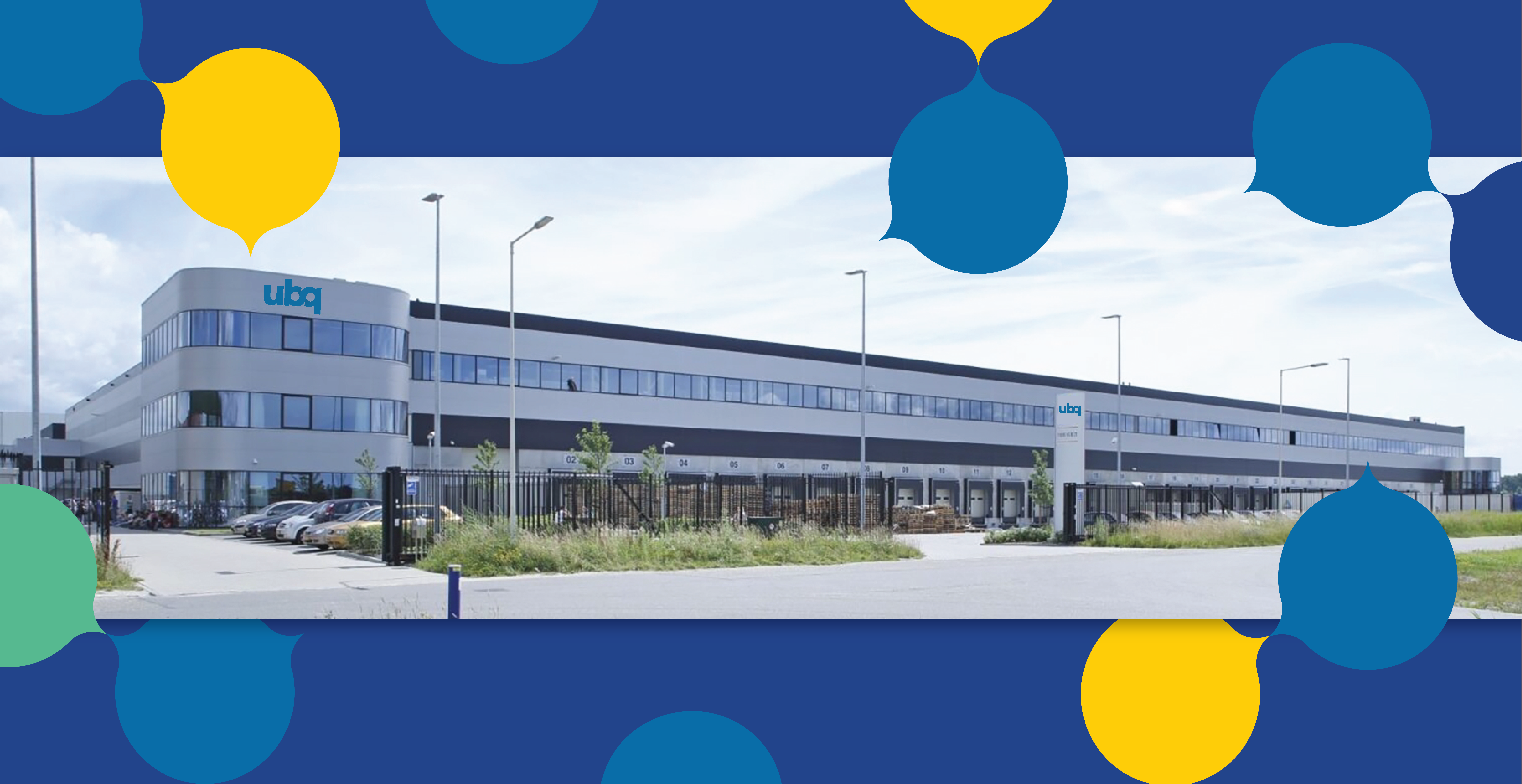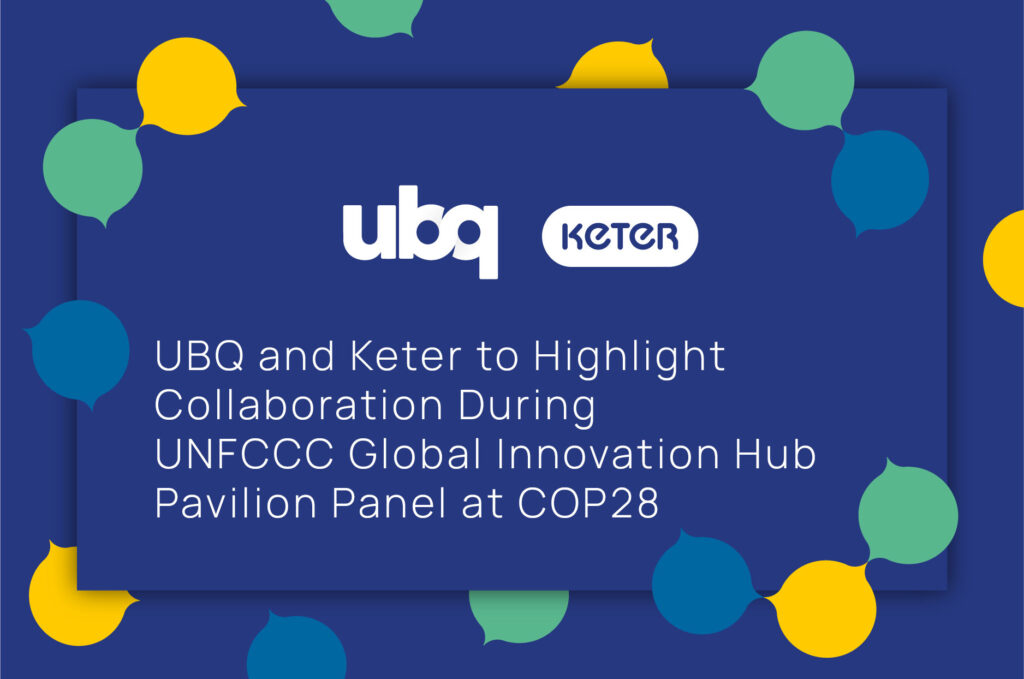The linear economy, characterized by the take-make-dispose model, has long been the cornerstone of global industrialization. However, this model is fraught with inefficiencies, contributing to the depletion of finite resources, escalating manufacturers’ carbon footprint and generating immense volumes of waste that are hard to recycle. Rather all the residual waste created through humanity’s overconsumption and insufficient sorting systems and methodologies leads to disposal in landfills, incineration, and in worst cases, unmanaged dumping, resulting in significant impacts on both the environment and human health.
UBQ Materials, a climate tech developer of thermoplastics made from mixed residual household waste, has developed a solution to minimize unsustainable waste management practices which are fueled by the linear economy. UBQ converts residual waste aimed for landfill or incineration into a novel natural resource that can replace conventional plastics and wood. Its solution allows industry to live in harmony with the planet by preserving finite resources and advances a circular economy.
UBQ’s expansion into The Netherlands with its industrial facility in Bergen op Zoom (BOZ) illustrates a sustainable model that can be duplicated in any country. UBQ’s waste conversion technology provides an environmentally and economically sound solution to transform a region’s waste into a valuable feedstock of industry. This proven, bio-based, climate positive material meets performance requirements per application and is already being used to produce durable and semi-durable products in building and construction, automotive, consumer durables, supply chain & logistics and other manufacturing applications with leading global brands including Mercedes Benz, PepsiCo and McDonald’s.
This case study sheds light on how UBQ Materials addresses the global waste crises at its core by converting unsorted residual waste into a novel thermoplastic, thereby reducing landfill and incineration waste and pollution. UBQ’s approach also aligns seamlessly with the emerging circular economy, where materials are continually reused, recycled, or repurposed, effectively curbing manufacturing emissions and reducing the strain on finite resources.
CREATING THE SOLUTION: OVERCOMING TECHNICAL CHALLENGES TO SCALABILITY
Unlike most new material innovations developed in lab environments, UBQ Materials developed UBQ™, its waste-based thermoplastic material, at an industrial scale at its Ze’elim Facility in Israel. The company set its sights on having a global impact by using industrial-scale machines to achieve efficient and highly scalable production of the material. UBQ’s unique 3rd generation feedstock comprises raw municipal solid waste (MSW) in a pre-treated form, known as Solid Recovered Material (SRM). This waste by-product undergoes mechanical processing leading to a significantly drier and cleaner form, suitable for UBQ’s upcycling process and applicable across various markets.
In some countries, pre-processed MSW in the form of RDF (Refuse Derived Fuel) and SRF (Solid Recovered Fuel) are typically used as fuel alternative in cement kilns, Waste to Energy (WtE) and incinerators. The specifications of these materials can serve as the basis for UBQ’s feedstock SRM, allowing UBQ to seamlessly integrate into prevailing waste management practices and outputs, and establishing it as a universally adaptable solution.
Despite the inherent challenge of being made from mixed waste, UBQ Materials has managed to create a homogenous and consistent UBQ™ material. The company has attained the highest-level certifications and industry validations for its materials and process such as REACH, ROHS, GADSL, and IATF. Earning UL certification (UL2809)1 in May 2022, affirmed its utilization of 100% post-consumer recycled content, strengthening its appeal to industry leaders across the globe looking to increase recycled content in their products, and exemplifying how UBQ can be a transformative solution globally.
EXPANDING HORIZONS: THE NETHERLANDS AS A STRATEGIC LAUNCHPAD
The Netherlands emerged as the perfect launchpad for UBQ’s global ambitions, primarily due to its strategic location and advanced waste ecosystem. In the face of regulatory challenges, UBQ adeptly secured community and government2 support by placing a strong emphasis on sourcing preprocessed waste materials and adhering rigorously to environmental standards.
The company’s new plant in BOZ utilizes 104,600 metric tons of RDF from local waste processing partners and converts it into 80,000 tons of UBQ per year. The system was pre-designed to be resource efficient, modular, and scalable, using multi-line layout capacity, paving the way for mass production and global expansion of UBQ.
UBQ’s BOZ facility serves as a testament to the profound impact of this innovative solution. Opening in the Brabant region, known for its advanced industry and manufacturing technology, the facility has created 130 full-time jobs for its residents. It has also supported the region’s transformation into a sustainable manufacturing hub while enhancing its recycling rates to comply with the state’s target.
CONCLUSION: PIONEERING A SUSTAINABLE FUTURE, ONE SCALABLE SOLUTION AT A TIME
As the focus on sustainability continues to expand worldwide, UBQ Materials represents the transition from the old world of fossil-based materials to the new world of sustainable secondary-raw materials and low-carbon applications. By addressing the global waste challenge, the linear economy and finite resource utilization, UBQ is leading the way towards a more sustainable future through its climate positive, economically competitive, and highly scalable material offerings.
UBQ’s commitment to utilizing 100% residue waste, including all organics, aligns seamlessly with the core principles of the circular economy, which regard wasted materials as valuable resources for creating new, environmentally responsible products. UBQ’s innovative approach simultaneously mitigates the environmental impact of waste while also advancing the concept of a circular economy, placing emphasis on sustainability, resource efficiency, and reduced manufacturing emissions.



